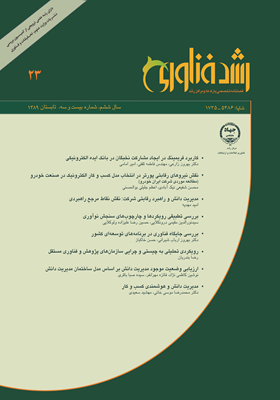مديريت دانش و هوشمندي كسب و كار
محورهای موضوعی : مديريت دانش
محمدرضا موسی خانی
1
![]() ,
مهشید سعیدی
2
*
,
مهشید سعیدی
2
*
1 - دانشگاه تهران
2 - -
کلید واژه: مدیریت دانش, هوشمندی کسب و کار, سيستمهاي اطلاعاتي مديريت, يكپارچگي,
چکیده مقاله :
هدف اين مقاله بررسي رابطه KM1 و BI2 ميباشد. نوعي ابهام در مورد ارتباط بين KM و BI وجود دارد. BI بر روي دانش صريح تأكيد دارد، درحالي كه KM هم بر دانش صريح و هم دانش ضمني تأكيد دارد. هر دو نگرش يادگيري، تصميمگيري و ادراك را توسعه ميدهند. KM بر BI تأثيرگذار ميباشد، چرا كه تأثيرگذاري KM بر BI در ارتباط با ايجاد دانش سازماني، انتقال دانش و يادگيري ميباشد. بنابراين اين مقاله با بررسي اهميت همبستگي KM و BI، BI را به عنوان زير مجموعهاي از KM مطرح نموده است. اين رابطه از اين نظر حائز اهميت است كه باعث تصميمگيري درست در سازمانها ميشود. چرا كه در دنياي پر تلاطم امروز شركتها بيش از پيش ميبايستي مزيت رقابتي خود را از طريق سياستها و راهبردهاي سازماني، واكنش مناسب به رقبا، مصرف كنندگان، تأمين كنندگان خود حفظ كنند. اطلاعات به عنوان مهمترين عامل براي شركتها و سازمانها شناخته شده است. بنابراين تركيب KM و BI نه تنها باعث ذخيره اطلاعات مفيد براي شركتها ميشود، بلكه عملكرد سازمانها و شركتها و فرايندهاي آنان را بهبود ميبخشد.
This paper explains the nature of integration between knowledge management (KM) and Business Intelligence (BI). There has been some confusion as to the relationship between KM and BI. BI mainly focuses on explicit knowledge, but KM encompasses both tacit and explicit knowledge. Both of them promote learning, decision- making and understanding. KM influences BI through organizational knowledge creation, knowledge transfer and learning. Therefore, this paper defines BI as a part of KM by evaluating importance of their integration. As this relationship improves right decision-making in organizations and their performance because of the rise and fall of the economic environment, enterprises need to adjust their policies and strategies rapidly in order to respond to sophistication of competitors, customers and suppliers. Information is known as the main key for enterprises so integrating Business Intelligence and Knowledge management are used not only for saving suitable information for enterprise but also for improving performance and process of activities in organizations.

